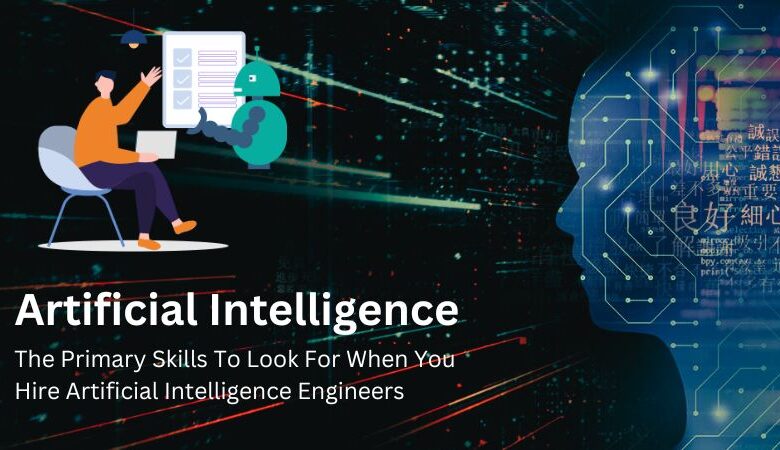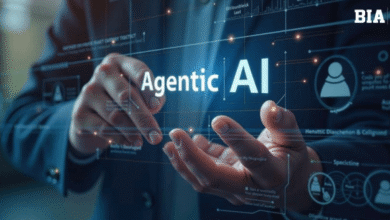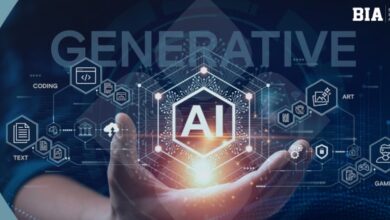The Primary Skills To Look For When You Hire Artificial Intelligence Engineers

AI is reshaping industries and firms, offering opportunities for innovation, efficiency, and competitive advantage. However, finding the right talent to build and implement AI solutions remains a significant challenge. When seeking to hire artificial intelligence engineers for your team, you must consider a range of essential skills, both technical and soft, that indicate a strong candidate.
Technical Skills:
Math And Algorithms:
A strong foundation in mathematics, statistics, and algorithms is fundamental for AI engineers. It includes a grasp of linear algebra, calculus, probability theory, statistical modeling, hypothesis testing, and algorithm design. AI solutions rely heavily on mathematical and statistical models, and the ability to select the right techniques and translate real-world problems into mathematical constructs is crucial.
Programming:
Proficiency in programming languages commonly used for AI development will be a must. Familiarity with libraries like Pandas, TensorFlow, NumPy, SciPy, and PyTorch is pivotal. Programming skills are critical for tasks such as data preprocessing, model training, and solution production.
Data Modeling:
Skills in data modeling techniques such as classification, clustering, and regression are necessary to uncover patterns and insights from data. AI engineers should be capable of selecting, training, evaluating, and optimizing models for various applications, including forecasting, recommendations, and predictions.
Machine Learning:
In-depth expertise, including supervised learning (classification, regression), unsupervised learning (clustering, dimension reduction), reinforcement learning, and neural networks like CNN and RNN, is pivotal. Knowledge of ML frameworks like TensorFlow, Keras, and PyTorch is essential, as is the ability to select, implement, tune, and operationalize ML models.
Data Engineering:
Proficiency in data-related tasks, including data collection through APIs, web scraping, and sensors; data storage and processing using SQL/NoSQL databases, data warehouses, and Spark; data cleaning, transformation, and feature extraction; as well as data visualization and reporting, is a must. These skills are crucial for accessing high-quality, well-organized data for training AI models.
Software Engineering Skills:
AI engineers should also possess various software engineering abilities, including:
Software Design And Architecture
The ability to design robust, scalable solutions and architectures for the real-world deployment of AI models is pivotal. This involves defining interfaces, microservices, and APIs, choosing deployment architectures (cloud, on-premise, hybrid), and addressing model retraining, versioning, and monitoring.
Software Testing And Debugging:
Proficiency in testing, debugging, and troubleshooting complex AI systems will be primary. This includes unit and integration testing of models and pipelines, monitoring models post-deployment, performance testing for scalability, and handling edge cases and failures.
Software Engineering Best Practices:
Following sound software engineering principles such as modular, reusable code, source control with Git, code reviews, documentation, Agile methodologies, and continuous integration/continuous delivery (CI/CD). These practices ensure the long-term maintainability and extensibility of AI systems.
Domain Expertise:
While technical skills serve as the foundation, AI engineers also need domain-specific knowledge relevant to the business problem. This includes:
Industry Knowledge:
Expertise in the industry vertical, whether retail, healthcare, manufacturing or any other domain. This knowledge provides an understanding of key data sources, variables, use cases, and challenges unique to that specific industry.
Product Sense:
A strong understanding of the specific product and business environment is needed to frame problems precisely and identify high-value AI application areas.
Data Intuition:
The ability to review existing data sources, identify gaps, and provide guidance on additional data needed to train robust models. AI engineers must understand the real-world implications of data quality issues.
Great AI engineers complement their technical skills with domain insights and intuition, making them effective problem solvers.
Soft Skills:
In addition to technical capabilities, specific “soft” skills significantly impact the success of AI implementations, including:
Creative Thinking:
AI engineers should analyze problems from new perspectives, make connections between seemingly unrelated domains, and arrive at innovative solutions using AI. Creative thinking is essential for pushing the boundaries of AI applications.
Communication:
The ability to explain complex models and algorithms clearly to stakeholders, ranging from business teams to end-users. Effective communication is crucial for gaining buy-in and educating others about AI adoption.
Teamwork:
Effective collaboration with product managers, engineers, designers, and domain experts is essential for building holistic AI solutions. Working as a team and checking egos at the door fosters successful AI projects.
Ethics:
A commitment to ethics, including privacy, transparency, and bias mitigation, is vital. AI engineers must ensure the responsible use of AI and educate stakeholders about potential risks.
The unique combination of specialized technical skills, software engineering expertise, domain knowledge, and soft skills is what makes a world-class AI engineer capable of driving impactful innovations. When hiring for your team, be sure to identify these essential qualities.
Constructing A Strong AI Team:
To ensure the success of an enterprise AI program, you need to assemble the right mix of roles and skills. In addition to hiring individual AI engineers, consider building a comprehensive team that includes:
- Machine Learning Scientists
- ML Engineers
- Data Scientists
- Data Engineers
- Domain Experts
- Program Managers
- Software Engineers
- User Experience Designers
- Data and Ethics Specialists
This diverse team, combining technical talent, business acumen, and soft skills, forms a strong foundation for AI success.
Developing AI Talent In-House:
Given the shortage of AI talent, forward-thinking companies are cultivating AI skills internally through:
- Focused Training Programs
- Internal Mobility
- Learning Culture
A combination of external hiring and internal talent transformation is crucial to unlock the full potential of AI for the organization.
Partnering With AI Talent Providers:
Considering the shortage of qualified candidates, partnering with specialist AI recruiting firms can significantly improve sourcing success. Some benefits of such partnerships include optimized sourcing, pre-screening, right matching, access to domain networks, salary benchmarking, and negotiation support.
Conclusion:
The demand for AI engineers continues to outstrip supply. Organizations must adopt a multi-pronged strategy that combines external hiring, internal talent development, and partnerships to build robust AI teams. Understanding the blend of technical skills, software expertise, domain knowledge, and soft skills that make an AI engineer successful is key. The stakes for AI success continue to rise, and access to a world-class, future-ready AI team is a crucial determinant of that outcome.
Read More:





